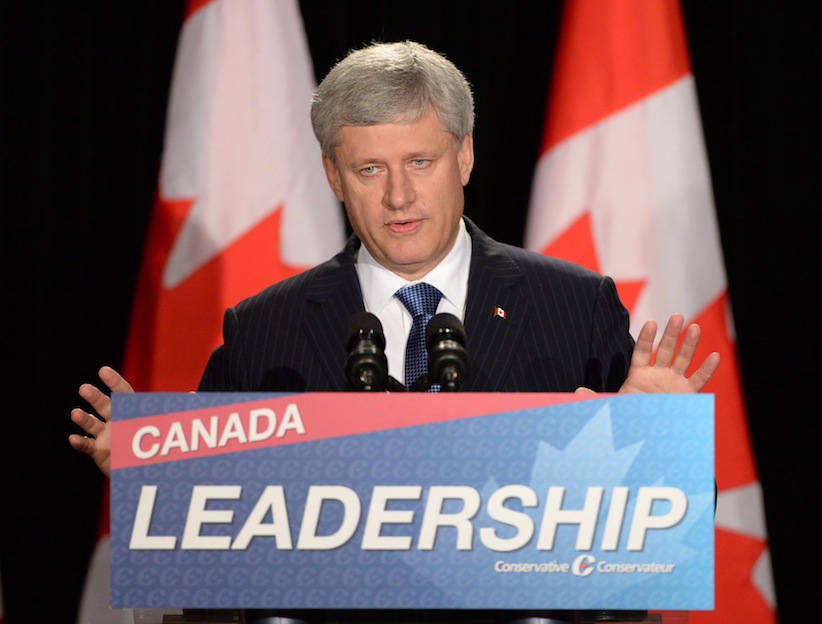What Conservatives should look for in a new leader
Former senior strategist Ken Boessenkool on the five critical qualities a new Conservative leader needs
Conservative Leader Stephen Harper makes a campaign stop in Ottawa on Sunday, August 9, 2015. Canadian’s will head to the polls on October 19, 2015. THE CANADIAN PRESS/Sean Kilpatrick
Share

The Conservative party has a remarkable opportunity to prepare to regain power in the wake of our equally remarkable nine-year run in government. Together we have moved Canada in a conservative direction on a broad range of policy fronts. And we owe it to our record, to our movement and to our party to continue to do so.
Key to regaining power is selecting the right leader.
Politics today is more leader-driven than ever before. This campaign, if anything, reinforced this. The public did not turn away from the broad policy agenda of Conservatives, instead they turned toward “change” as embodied in Liberal Leader Justin Trudeau.
Conservatives need to thoughtfully, and carefully, consider the qualities for our new leader. Conservatives will certainly face Justin Trudeau again. And while it is possible that our ads will finally prove true – that he’s just not ready – we shouldn’t count on it.
What qualities ought Conservatives to be looking for? I think there are five critical ones. Let me say up front that I don’t know of anyone that fills all five perfectly. And I am not shilling for, or against, any prospective candidate.
First, the leader must embody the current policy and political soul of the Conservative party. They must be small-“c” conservatives. This means favouring low taxes, controlled spending, balanced budgets, stronger families, a decentralized federation and a principled and muscular foreign policy.
But we can go deeper. Conservatives should look for someone who prefers direct payments to families over institutional childcare; who can vigorously defend our record of large (GST, income-splitting) and targeted (child fitness and arts tax credits) tax cuts; who prefers that provinces run health care unhindered from Ottawa; who supports Israel’s right to defend itself; and who supports smaller government and larger civil society. In short, a new leader should be excited about defending and consolidating the gains we have made.
Second, the leader must have, or enunciate, a powerful view of conservatives’ future and the future of Canada. This will be more difficult and each candidate will bring its own strengths to the table.
To do so, a new leader must answer some or all of the following: What is the right role of government in enabling and strengthening families? What is the right role of government in enabling and strengthening civil society? What is the right role of government in addressing the environment and climate change? What is the right role of government in enabling life changes: school, university, working or starting a business, marriage, home ownership, children and retirement? What is the right role of Canada on the world stage? Finally, a new leader needs to robustly defend Canadian values – because conservative values are Canadian values.
Third, gender matters. Fifty years ago it was accepted that leadership in politics was the preserve of men, I believe that leadership in politics today is increasingly the preserve of women.
Think I’m wrong? Tell me the last woman leader of a party in serious contention in a major province that was beaten by a man their first time out. Women rule, whether Conservative or Liberal or NDP. Christy Clark, Alison Redford, Rachel Notley, Kathleen Wynne, Pauline Marois—all won their first election as leader. You have to go back 20 years to Kim Campbell and Lyn McLeod to see a woman lose her first time out. Conservatives would be wise to carefully consider this reality.
Fourth, geography. Preston Manning, Stockwell Day and Stephen Harper all hailed from Alberta during their tenure as leaders. And while it is true that Jean Charest and Peter Mackay hailed from elsewhere and Joe Clark arguably didn’t, a leader from outside Alberta should be seen as preferable to a leader from Alberta.
Fifth, age. While Trudeau proved that a new, young and inexperienced leader could win a majority the first time out, Conservatives should not consider this the norm. We need a leader that can contest multiple elections, particularly if they don’t win the first one. I think this means a new leader should have sixteen years of runway ahead of them (a two-election strategy to win, and then two terms in office). We certainty shouldn’t consider anyone with less than 12. What age does that mean? Well, Chretien was nearly 70 when he finally stepped down.
Stephen Harper left us a Conservative party that is strong, vibrant and ready to contest for power. We must build on this legacy. We owe it to our record, to our movement and to our party to get this leadership right.
Ken Boessenkool has played senior roles on leadership campaigns for Stockwell Day, Jim Dinning, Stephen Harper (twice), Christy Clark and Ric McIver and in the 2004, 2006, 2011 and 2015 national Conservative campaigns.